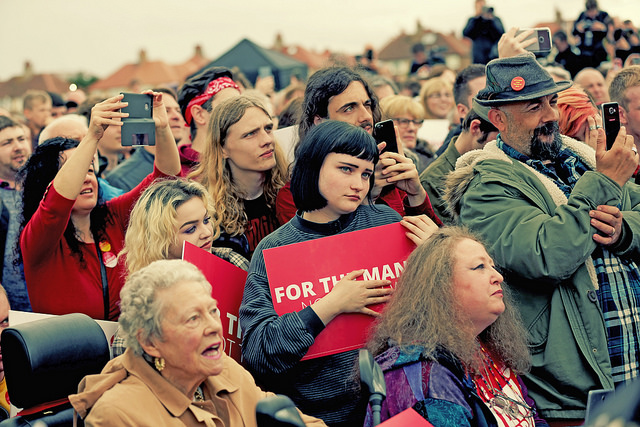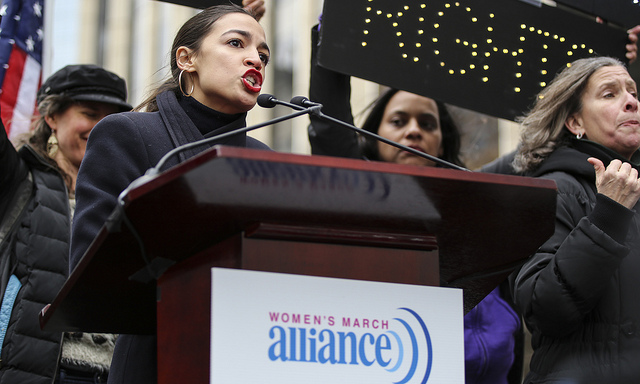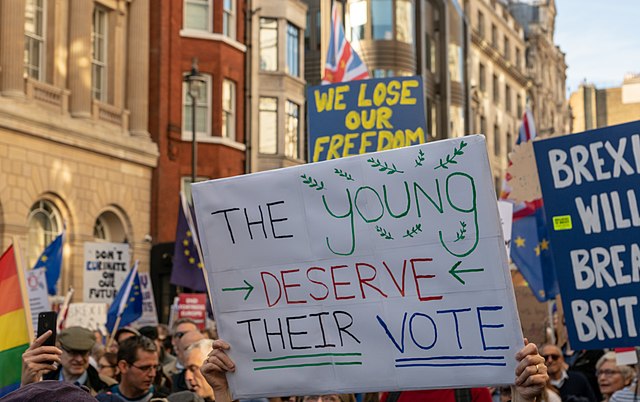- 200 years
- Study
- International
- Business and employers
- Research
- About us
Is there a youthquake in the Parties of the Left in the UK and USA? Nearly two years ago the 2017 General Election saw a surge in electoral registration, in young votes and in public interest in young voters and the issues that motivated them. The election, which was called by many the Youthquake election, had many people asking the question: are young people changing politics on the Left?

Jeremy Corbyn campaign in West Kirby. Photo by Andy Miah. https://www.flickr.com/photos/andymiah/34738981626
2017 felt exciting for young politics in the UK. The election result will have left most young voters wanting: it returned a hung Parliament with the Conservatives as the largest party, even though most under-45s wanted Labour. There was, nevertheless, a sense of young insurgency about the election, about a new and more youthful Opposition and about the prominence of reforms like the 2017 Private Members Bill sponsored by Jim McMahon to bring in Votes at 16.
Two years later, in 2019, the word ‘Youthquake has rather vanished from our vocabulary. At election time, the Grime4Corbyn campaign was big news; now, although one might credit the prominence of Akala in public debates such as those on knife crime, it is hard to find examples of lasting change to the way institutional politics is done in the UK.
In Brexit, for instance, there are young voices out there to be heard. Organized movements of young people on the European question. Supporters of a softer Brexit (or indeed Remain) often claim they would gain much from the inclusion and support of younger people. As Avril Keating points out, a significant minority of young people support leaving the EU. All sides of this debate would find a better way through by consulting their youngest constituency. Yet, it is hard to see where young people have a meaningful say in the process of Brexit.
Neither in campaigning, nor in political institutions, do we see a lasting change to institutional politics in this country.

Yet, in 2019, it is across the Atlantic in the United States that we see a change – albeit a gradual one – in political practice and political discourse. A youthful change of a different kind is perhaps afoot. There, relatively young, and certainly outspoken candidates for office like Alexandria Ocasio-Cortez and Rashida Tlaib are forging new ideas of what it means to be in political office.
Take, for example, the appearance of freshman Representative Alexandria Ocasio-Cortez on a livestream video game session of the game Donkey Kong 64, in which the gamer was fundraising for UK-based charity Mermaids, which supports gender diverse and transgender children. Or the swearing-in of Rep. Rashida Tlaib, for which she brought her two young children, who each performed a dab dance manoeuvre in Congress.
These things seem small, but they are backed up by political change. Ocasio-Cortez had to quit a job as a bartender to take up her post. She is an outspoken reformer and a proud socialist amid a rapid shift in the way young people in the United States consider capitalism and socialism, and at a time when so many young people live in precarious circumstances and expect, all things being even, to end up worse off than their parents. Tlaib is a reformer too: she turns up at street protests and speaks proudly of her anger at the economic hardship faced by her constituents in Detroit.

The bottom line here is that in the UK, as in the US, what speaks to young people most is economic reform. A youthful style – playing Nintendo on YouTube, dancing in Congress and tagging Taylor Swift in their election day selfies – helps, but what matters is the policy at the end of it.
In the UK, where every issue seems swallowed up by Brexit at the moment, the absence of young people from the style and, most importantly, the substance of Party politics is noticeable. Young people feel left out of the process and expect to be short-changed by the result of Brexit.
Most results of the process will result in a continuation of some sort: a continued process of negotiation under Theresa May’s withdrawal agreement, an extension while Parliament tries to figure out something different, a second Referendum or a General Election are all possible.
In each case young people must be involved in the process. They must also be provided for in the substance. To give examples: in campaigning for a second referendum it should really be said that 16-year-olds have the vote in Scotland, will likely have the vote soon in Wales, and that at the case is at least tenable that they ought to have the vote in an EU referendum too.
And young issues need to be at the forefront of any campaign. What will the result be for young people? Will it have a bearing on zero-hours contracts and renter’s rights? The right to travel to mainland Europe for studies? How about on tuition fees? Involving young people in the process and providing for them in resultant policy will be a step towards the Youthquake we were all talking about in 2017.
Ben Bowman is a Lecturer in Youth Justice. B.Bowman@mmu.ac.uk.